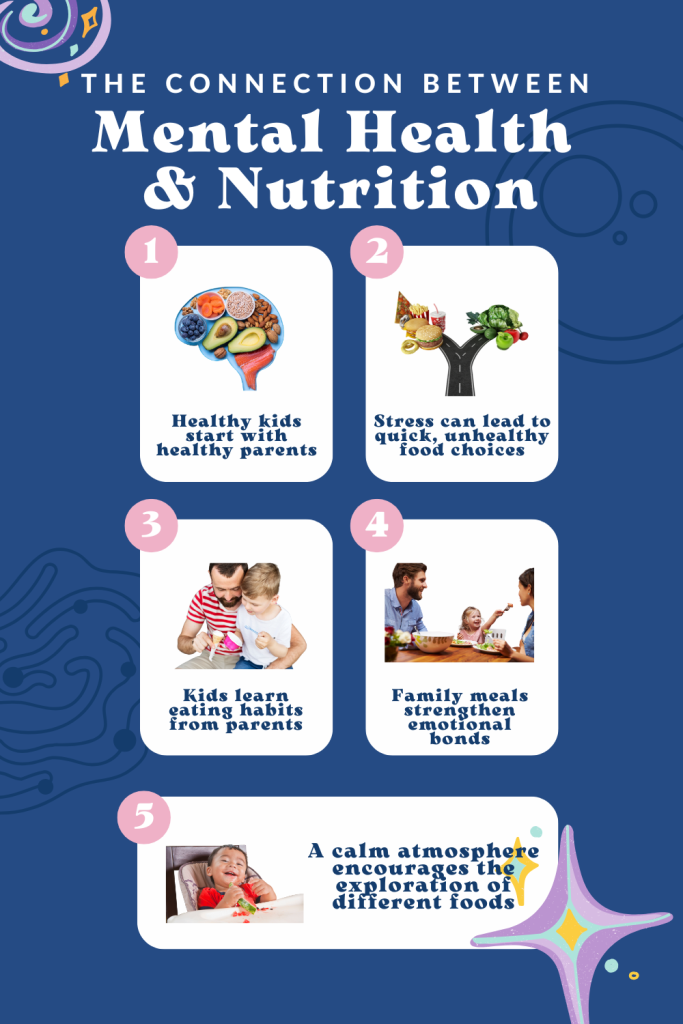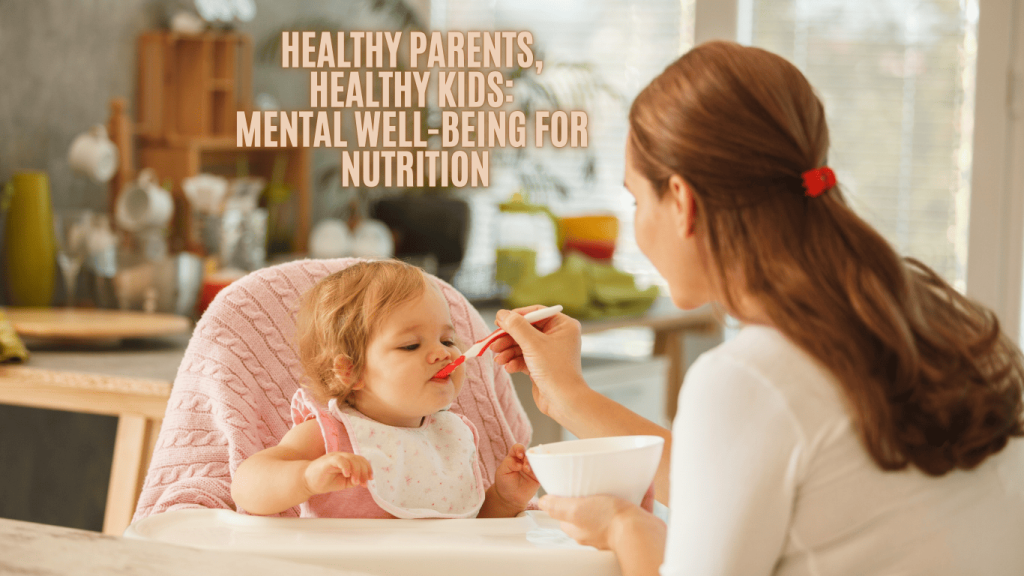As parents, we often focus on ensuring that our kids have nutritious meals and complete their schoolwork to grow up strong and healthy. But how often do we stop to consider our own mental well-being? And how does the state of our mental health affect our kids, particularly regarding child nutrition?
The truth is, raising healthy kids goes beyond filling their plates with veggies. “Healthy kids start with healthy parents,” not just physically but emotionally and mentally. In this blog, we’ll explore how a parent’s mental well-being plays a role in their child’s nutrition and how prioritizing our mental health creates a healthier environment for our children.
The Link between Mental Health and Child Nutrition
Imagine this: after a tough day at work, all you want to do is grab something quick and easy for dinner—maybe even takeout. Preparing nutritious meals feels like a chore. This cycle, when repeated often, can influence our children’s relationship with food. Stress and mental exhaustion directly impact the nutrition meals of the entire family.
Research shows that parents’ mental health can shape their child’s nutrition. When we’re anxious, stressed, or emotionally drained, we’re less likely to make the best food choices, for ourselves or our families. It’s not just about the food, either—it’s about the atmosphere we create during meals and the emotions tied to eating.
For example, when we’re rushed or distracted, meals become quick tasks rather than family moments. This stress-filled eating environment may affect children’s views of food, turning it into something to get through rather than something to enjoy.
Breaking the Emotional Eating Cycle

We’ve all had those days where stress pushes us toward comfort food. Whether indulging in ice cream after a hard day or snacking on chips out of boredom, emotional eating is a common way to cope with stress. However, it’s important to recognize how these habits can affect our children.
Kids observe our behaviors, even when we don’t realize it. If they see us turning to food for comfort, they may pick up on this pattern. While occasional indulgence is normal, regular emotional eating can lead to unhealthy food relationships later in life.
Breaking this cycle starts with addressing our own mental health. When parents practice emotional awareness, they model healthier behaviors. By seeking alternative ways to manage stress—like exercise, talking to a friend, or practicing mindfulness—we show our children that food is for nourishment, not an emotional crutch.
The Importance of Family Mealtimes
In our busy lives, finding time for family meals can feel impossible. Between work, school, and extracurriculars, sitting down together at the dinner table is a challenge. However, family meals are about more than just eating together; they provide opportunities to bond, communicate, and instill positive child health and nutrition habits.
Research suggests that kids who eat with their families tend to have healthier diets and stronger emotional connections. Family meals allow us to teach our children about balanced eating, not just through what we serve but how we engage during the meal. Conversations at the table also create space for kids to express themselves and learn about food and nutrition in a positive, pressure-free environment.
Even if it’s just a few times a week, sitting down together can make a world of difference. No need for elaborate meals—just being present and involved with your child’s experience at the table fosters healthy food attitudes.
Managing Mealtime Stress
When parents are stressed, mealtime can become a battleground. You might find yourself nagging your child to finish their veggies or feel frustrated when they refuse to eat what you’ve prepared. The stress we carry often spills over into how we approach food and meals, resulting in negative associations for kids.
Managing your own stress can help create a calm and inviting atmosphere at the table. When you approach meals with patience and mindfulness, your child is more likely to feel at ease and explore different foods. Instead of turning mealtimes into power struggles, offer choices, allow for flexibility, and show understanding. This creates a positive relationship with food that extends beyond the dinner table.
Read Also :- Baby Is Eating Enough
Self-Care and Parenting
We often put our children’s needs first, leaving little room for self-care. Yet, self-care isn’t selfish—it’s essential for both you and your family’s well-being. When you prioritize your mental health, you’re not just benefiting yourself; you’re creating a more balanced, loving environment for your child.
Here are a few ways to prioritize mental well-being while fostering healthy nutrition meals:
- Practice Mindfulness: Being present can help you slow down and reduce stress during meals.
- Seek Support: If you’re feeling overwhelmed, don’t hesitate to reach out to a professional. Parenting is tough, and asking for help is okay.
- Prioritize Rest: Sleep is essential for mental health. When well-rested, you’re better equipped to make sound food choices and create a peaceful home environment.
- Lead by Example: Show your children that taking care of yourself is important. Whether through exercise, eating balanced meals, or finding time to relax, your actions teach them the value of self-care.
Healthy children start with healthy parents. Your mental well-being isn’t just important—it’s the foundation for creating a balanced, nurturing home environment where children can grow emotionally and physically strong. By taking care of yourself, you’re giving your child the best gift: the tools to develop a positive relationship with food and a calm, connected family dynamic.
So next time you’re feeling overwhelmed, remember: by nurturing yourself, you’re also nurturing your child. A healthy parent means a healthy family.




